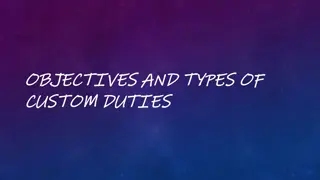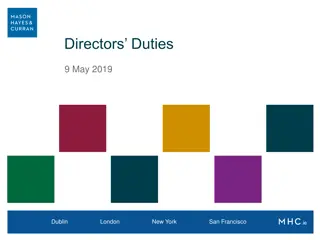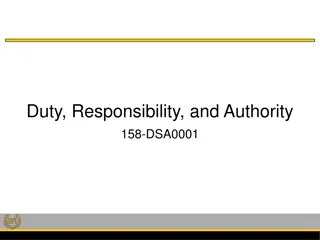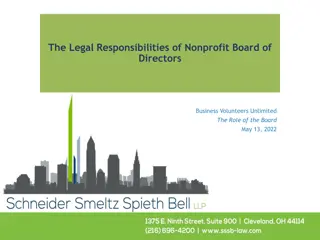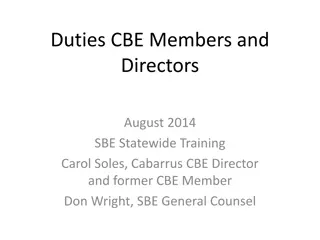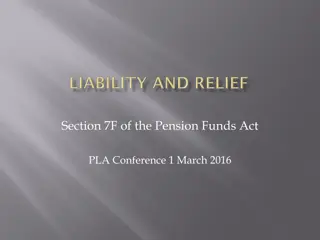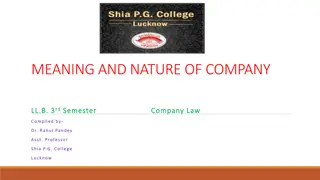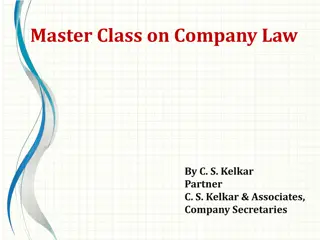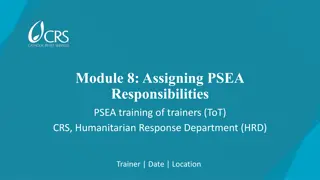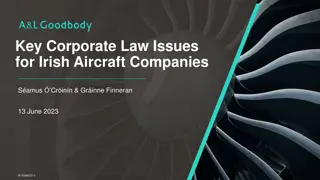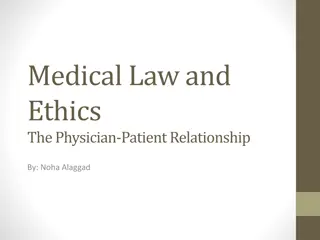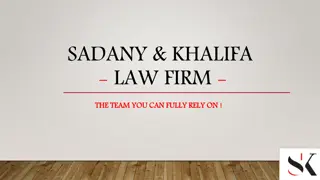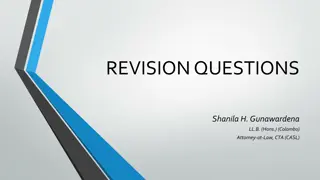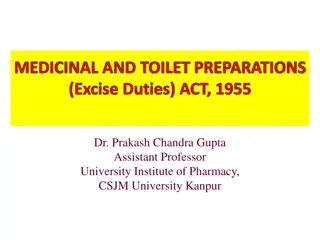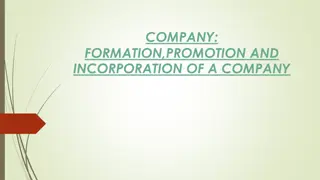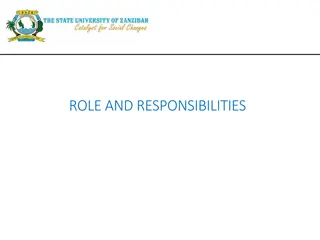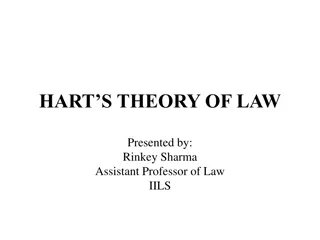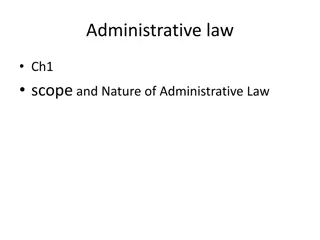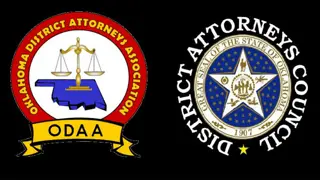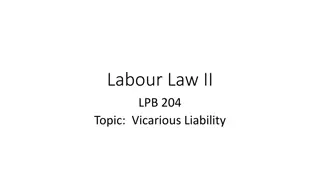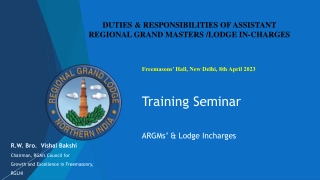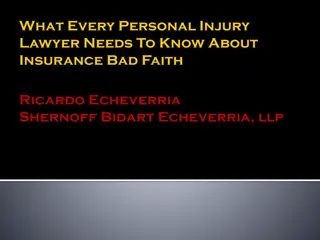Director Responsibilities and Duties in Company Law
Discusses the roles and responsibilities of company directors, focusing on the legal duties outlined in company law. Covers the separate legal entity status of companies, fiduciary duties, common law obligations, and specific rules for directors. Emphasizes the necessity for directors to act in good faith, with care, skill, and diligence, while also considering the interests of shareholders, employees, and the company itself.
Download Presentation

Please find below an Image/Link to download the presentation.
The content on the website is provided AS IS for your information and personal use only. It may not be sold, licensed, or shared on other websites without obtaining consent from the author. Download presentation by click this link. If you encounter any issues during the download, it is possible that the publisher has removed the file from their server.
E N D
Presentation Transcript
Roles and Responsibilities of Company Directors Kevin Prendergast Head of Enforcement, ODCE.
Company Law and Directors Duties Company is a separate legal entity Can sue and be sued in its own name Holds assets and incurs liabilities separate from its members/shareholders Confers limited liability on members/shareholders
Company Law and Directors Duties Company is managed on behalf of members by Director/Board of Directors Duty under law to the company Board has collective responsibility for all actions (and omissions) by the company Company law focuses on directors as holders of power
Company Law and Directors Duties Specific rules contained in Companies Act Parts 4 and 5 and Constitution Composition of Board Appointment/retirement Quorum, etc.
Roles and responsibilities of boards Primary responsibilities set out in company law Additional duties set out in Constitution These can be amended by members by special resolution Also general duties of loyalty and fidelity (which apply to all staff)
DIRECTORS DUTIES COMMON LAW FIDUCIARY DUTIES Section 228, Companies Act Act in good faith and in company s interest Act honestly and responsibly in conduct of company affairs Act in accordance with company s constitution
DIRECTORS DUTIES COMMON LAW FIDUCIARY DUTIES Not use company property/information/opportunity for personal/third party gain without shareholder approval/constitutional support Not fetter judgement unless in company interests/shareholder approval Avoid conflicts of interest
DIRECTORS DUTIES COMMON LAW FIDUCIARY DUTIES Act with due care, skill and diligence Have regard to interests of employees/members Have regard to particular interest of member with entitlement to appoint director
Breach of duties Not a criminal matter No ODCE involvement Actionable by the company in the High Court Expensive, time consuming Defence has right to seek discovery, can damage all sides
Shadow Directors Section 221 Companies Act a person in accordance with whose directions or instructions the directors of a company are accustomed to act shall be treated as a director of the company Other than advice given in a professional capacity
De Facto directors Section 222 Companies Act Person carrying out the role of a director even if not validly appointed
Shadow Directors/De facto directors Companies Acts apply Company Law offences and sanctions apply However Practical difficulty in using powers Difficult to defend actions
Requirements under Statute In setting up a company you get Limited liability In return you must provide Disclosure Accountability
Disclosure Three ways of disclosure At the company s registered office In the Companies Registration Office, www.cro.ie In communications, correspondence, IT
Registered Office Brass plate at the address Location of registers and minutes Publicly accessible Not served with any company notices, Company dissolved?
Companies Registration Office Dublin Carlow Annual Return and Financial Statements Changes in directors, registered office, memo and articles etc. All publicly available, www.cro.ie
From records to Annual Return Accounting records Financial Statements Approved by Board Reviewed at AGM Audited Sent to CRO
Communications Letters Emails/electronic correspondence Website
Accountability As well as disclosure requirements, the law also deals with limits on the powers of directors in particular with insolvency
Accountability Prohibition on Loans (subject to SAP) Limits on substantial property transactions Potential accountability in insolvency Mandatory Liquidator reports to ODCE Restriction, disqualification, personal liability
More Common Breaches On the basis of information coming to ODCE attention, the following are some of the more common breaches: transactions with directors - breaches of directors loans provisions 85 reports to ODCE bankrupts as directors - 46 reports auditing deficiencies - 35 reports failure to keep proper books of account - 21 reports failure to hold AGM/EGM - 17 reports directors conduct - 17 reports reckless/fraudulent/insolvent trading - 62 reports
What to do? Advice to Directors Ask questions Don t assume anything Books & Records - where are they Discuss issues don t avoid them Seek professional advice Consult your company secretary/auditors/legal advisors Possibility of insurance
Companies Act Commenced 1 June 2015 Primarily aimed at helping SME s Main changes for LTDs Single director, separate secretary Elimination of memo and articles Meetings by paper record Need to opt in for advantages See www.cro.ie
Sources of Information ODCE publications Information Books and Quick Guides; Specific guidance on new law. ODCE website www.odce.ie All publications; Corporate governance best practice and access to main reports public notice information e.g. civil enforcement action, prosecutions, insolvency information; access to full complement of company law statutes etc.; information on ODCE services. LO - CALL 1890 315 015, email info@odce.ie, Facebook, Twitter
Where is the registered office of the company? Are your website and emails compliant? Are you a properly appointed director? What books and records do you have? Who maintains your accounts, and where? Have your books ever been audited? When was your last meeting of directors? When was your last AGM/EGM? What is your annual return date (ARD)? Are you taking advantage of your power as a director? Are you in financial trouble?


